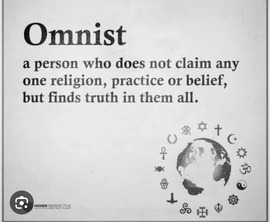Enjoy being online again!
Welcome to the community of good people who base their values on evidence and appreciate civil discourse - the social network you will enjoy.Create your free account
8 comments
Feel free to reply to any comment by clicking the "Reply" button.Many of the founding father of the U.S. described themselves as Deists, which is the belief in a god without not in any religious tradition. I wonder how many of them would actually be considered to be Omnist, if the word was available to them.
All religions to teach some sort of truths. If they didn't, then they would never be able to get people to accept th crap that comes with the rest of it. It is a fallacy that just because thee is one or more true statements, that the entirety must be true, but that is the (flawed) reasoning used to convert people and that people use to accept religion.
I would like to convert you to believing in the rule of law, but I won’t be able to because some laws in the past have been found to be unjust.
There is usually a grain of truth in even the most outlandish lie.
I'm sure someone could find good things to say about John Wayne Gacy, Ted Bundy, Jeffrey Dahmer, and Ed Gein... but that doesn't mean they were good people.
Isn't that the Ultimate cherry picking technique on steroids?
@FvckY0u No there is not one single idea found in all religions, especially not one also found in even the most basic of philosophy. The Christians believed that a God sacrificed himself, painfully, to wash away the sins of humans. The Aztecs believed that you needed to sacrifice humans painfully, to wash away the failings of the gods. Apart from a belief in the nonsense of sacrifice, you can not get more opposite than that.
@FvckY0u Not at all. To take your second point first. Of course the Aztecs were not a religion, but a nation or culture, but that I used "Aztecs" as shorthand for Aztec religion, should be obvious, especially since we do not really know what the Aztecs called their religion. It does not therefore invalidate the point. Unless you are saying that the Aztecs did not have a religion ?
As to the use of the ad populum. Yes of course I am talking about what the general public means by religion. Not because I do not know that there are claims of special pleading to be made for some views of religion, but because it is what the general public views as religion which interests me and is of greatest importance in the world, and because having heard many special pleadings, and found none of them valid. I will therefore hold your special pleading for Omnism to be invalid too, until you can offer me some evidence to the opposite. Which returns to the point about the Aztecs, since it is therefore perfectly valid to include them in any discourse on religion until a special pleading is proved.
@FvckY0u I am sorry that you feel it is not your job to educate me, since I do enjoy being educated, and I had hoped that religious duty, and human charity went at least that far.
But to the first point are you saying that, the Aztecs did not have religion, that it is in the nature of religion to be clearly defined and that without clear definition it is not religion, or that we can not say whether they had a religion or not ?
@FvckY0u I see, so your omnist revelations do not extend to, not only Aztecs, but to Islam, Buddhism, the bible and anyone not reading "Autobiography of a Yogi" . Which is anything but omni, sorry even to define some things as not true religion but only "cultural practices" is not to even approach omni.
Ps I am familiar with Autobiography of a Yogi though I would prefer "The book of Atheist Spirituality" by Comte-Sponville, and especially "The Sacred Depths of Nature" by Ursula Goodenough, which I find much more spiritual in the true sense.
@FvckY0u And I am saying I have no problem with anyone following whatever books, philosophies, or religious practices they find useful or pleasurable. Only that I find the omni claim silly, given the great and often conflicting diversity of religions. And that the few common points observable between them, such as uniting people for common causes, ( Most frequently, evil common causes, such as to be against an, often misrepresented, common foe.) to be utterly banal.
While belittling some religions as not "true" religion is just redefining the word to fit with dogma. All religions can be made to fit an omni claim, if you narrow your definition of the word religion to include only one or two "true" faiths. Just as I can prove that. "All animals have tusks." If I say that only pigs and elephants are animals.
Enjoy being online again!
Welcome to the community of good people who base their values on evidence and appreciate civil discourse - the social network you will enjoy.Create your free account
Share this post
Categories
Agnostic does not evaluate or guarantee the accuracy of any content. Read full disclaimer.








